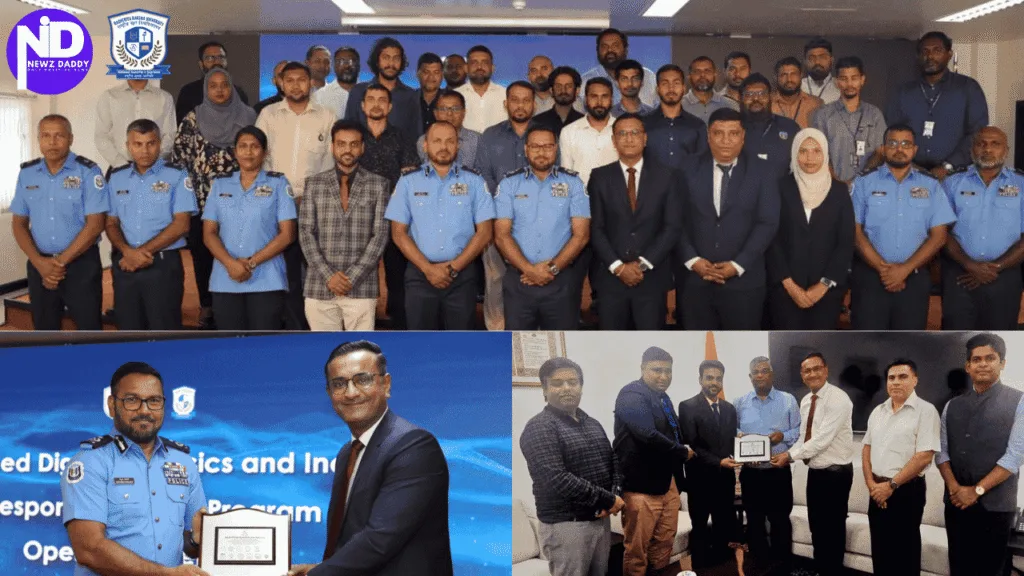Digital Forensics Training Boosts Police Power in the Maldives
Newz Daddy Educational Updates
The Rashtriya Raksha University in Gandhinagar, in collaboration with the Maldives Police Service and the National College of Policing and Law Enforcement in the Maldives, has completed a specialised training programme on Advanced Digital Forensics and Incident Response. This programme took place from November 15 to 20, 2025, at the Maldives Police Service facilities. It was planned under the Memorandum of Understanding signed on 7 October 2024 in the presence of India’s Prime Minister, Shri Narendra Modi, and the President of Maldives, Mr Mohamed Muizzu. This shows both nations want stronger ties in security and digital skills.
A total of 27 officers took part in the training. These officers work in different cyber and investigation units in the Maldives. The aim was to give them stronger skills in digital evidence and cybercrime methods. Today, cybercrime cases are rising every year across the world, and many small island nations like the Maldives face special risks due to tourism and online financial activity. This training supports the officers in handling these new threats with modern tools.
The opening ceremony on 15 November 2025 was attended by Mr Ajay Virendrabhai Rajgor, Dr Ravi Sheth and Mr Vivek Joshi from Rashtriya Raksha University. All three have years of experience in cyber training and digital forensics. Their work in India has already helped many state police forces build strong cyber labs, and they brought this experience to the Maldives. The ceremony stressed that this partnership is not only about training but also about long-term learning between both countries.
The programme was planned to give officers real skills for active cases. Today, digital evidence is used in almost all crimes, from online fraud to major security cases. Police around the world now depend on digital forensics teams. The Maldives Police Service has been building its cyber units over recent years, and this training adds expert support to those efforts.
The programme covered many key topics. Officers learned the core methods used in Digital Forensics and Incident Response. This included how to collect and preserve digital evidence so it is accepted in court. Many police forces face trouble because digital evidence can be damaged if handled wrongly. This training showed the correct steps to avoid this.
Officers studied Operating System and File System Forensics. This is needed for checking computers, mobile phones and storage devices. Many cybercrime cases involve hidden files, deleted data or unusual system behaviour. Learning how to read these signs helps solve cases faster.
They were trained in Memory Forensics and Malware Persistence. Malware attacks, such as ransomware and spyware, can stay hidden inside computer systems. Memory forensics helps officers track these threats even if the attacker tries to cover their tracks. This topic is now common in global cyber investigations, as attacks are becoming more advanced.
Network Forensics and Log Analysis were also included. This helps officers trace movements inside a network when a cyberattack happens. Logs show who accessed what system and when. This skill is important for the Maldives as many government services and travel systems run online and must stay safe.
The training also touched on cloud and large enterprise incident response. Many organisations now store data in cloud systems. Handling cyber incidents in the cloud needs special skills because the data may be stored in more than one location. This part of the training prepared officers for the growing use of cloud systems in policing and public services.
By the end of the programme, officers gained stronger skills to handle digital evidence, identify cyber threats, study device systems, track network attacks, and manage cloud incidents. These skills support safer online systems for the Maldives, which depends heavily on digital services for tourism, transport, and public safety.
During the training, on 8 November 2025, the RRU team also met the High Commissioner of India to the Maldives, Shri G. Balasubramanian, along with the Deputy High Commissioner, Shri Kumar Gaurav. They praised the university’s work and discussed new areas of partnership. India and Maldives continue to work together on training, capacity building and regional security. The meeting also showed support from the High Commission for further cooperation between RRU, MPS and NCPLE.
This programme highlights the shared goal of India and the Maldives to build strong cyber safety and ensure skilled officers are ready for the challenges of the digital world.
Must Read:
Law Students Shine In International Law Moot Court At RRU
Elevating international law, shaping tomorrow’s defenders of global security

